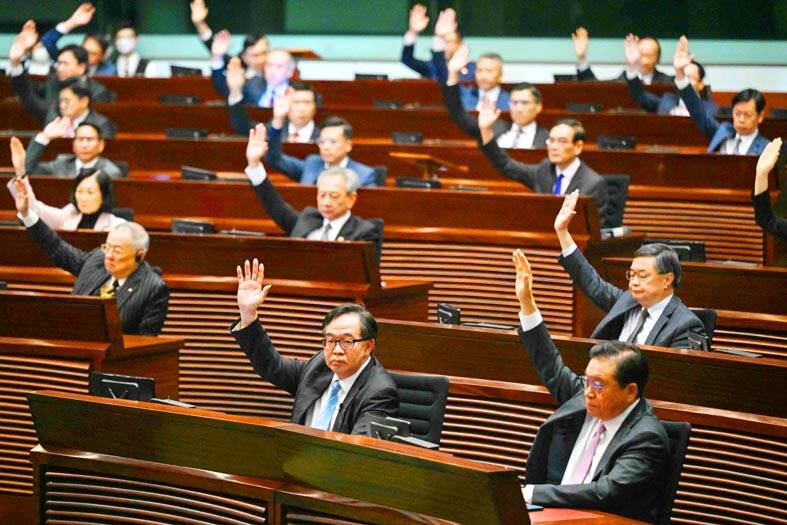China yesterday blasted critics of Hong Kong’s new national security law, after Western powers and the UN said it would further curtail freedoms in the territory.
Hong Kong’s Legislative Council on Tuesday passed the law unanimously, introducing tough new penalties for five categories of crimes including treason and theft of state secrets.
Commonly referred to as Article 23, the homegrown security law is to work in tandem with a 2020 Beijing-imposed version that has silenced nearly all dissent in the territory and led to nearly 300 people being arrested since its enactment.

Photo: AFP
Western nations including the US and the UK were swift to criticize the new law, with British Secretary of State for Foreign, Commonwealth and Development Affairs David Cameron saying it would “further damage the rights and freedoms enjoyed in the city” and calling the legislation “rushed.”
Chinese Ministry of Foreign Affairs spokesman Lin Jian (林劍) told reporters that “attacks and smears” against the new Hong Kong law by other governments and outside groups were “doomed to fail.”
“Security is a prerequisite for development, and the rule of law is the cornerstone of prosperity,” Lin said.
The law, which punishes treason, insurrection, theft of state secrets and espionage, sabotage, and external interference, is to plug “gaps” left by Beijing’s legislation, Hong Kong Chief Executive John Lee (李家超) said.
The government has said that its creation was a “constitutional responsibility.”
However, Cameron said the fast-tracked legislation undermined the 1984 Sino-British Joint Declaration, the internationally binding agreement that underlies the “one country, two systems” principle.
“I urge the Hong Kong authorities to ... uphold its high degree of autonomy and the rule of law, and act in accordance with its international commitments and legal obligations,” he said.
US Department of State spokesman Vedant Patel said that the US was “alarmed by the sweeping and what we interpret as vaguely defined provisions” in the law.
UN High Commissioner for Human Rights Volker Turk called the law and its “rushed” adoption “a regressive step for the protection of human rights.”

TPP RALLY: The clashes occurred near the Chiang Kai-shek Memorial Hall on Saturday at a rally to mark the anniversary of a raid on former TPP chairman Ko Wen-je People who clashed with police at a Taiwan People’s Party (TPP) rally in Taipei on Saturday would be referred to prosecutors for investigation, said the Ministry of the Interior, which oversees the National Police Agency. Taipei police had collected evidence of obstruction of public officials and coercion by “disorderly” demonstrators, as well as contraventions of the Assembly and Parade Act (集會遊行法), the ministry said in a statement on Sunday. It added that amid the “severe pushing and jostling” by some demonstrators, eight police officers were injured, including one who was sent to hospital after losing consciousness, allegedly due to heat stroke. The Taipei

NO LIVERPOOL TRIP: Taiwan’s Lin Yu-ting, who won a gold medal in the boxing at the Paris Olympics, was embroiled in controversy about her gender at that event Taiwanese boxer Lin Yu-ting (林郁婷) will not attend this year’s World Boxing Championships in Liverpool, England, due to a lack of response regarding her sex tests from the organizer, World Boxing. The national boxing association on Monday said that it had submitted all required tests to World Boxing, but had not received a response as of Monday, the departure day for the championships. It said the decision for Lin to skip the championships was made to protect its athletes, ensuring they would not travel to the UK without a guarantee of participation. Lin, who won a gold medal in the women’s 57kg boxing

‘NOT ALONE’: A Taiwan Strait war would disrupt global trade routes, and could spark a worldwide crisis, so a powerful US presence is needed as a deterrence, a US senator said US Senator Deb Fischer on Thursday urged her colleagues in the US Congress to deepen Washington’s cooperation with Taiwan and other Indo-Pacific partners to contain the global security threat from China. Fischer and other lawmakers recently returned from an official trip to the Indo-Pacific region, where they toured US military bases in Hawaii and Guam, and visited leaders, including President William Lai (賴清德). The trip underscored the reality that the world is undergoing turmoil, and maintaining a free and open Indo-Pacific region is crucial to the security interests of the US and its partners, she said. Her visit to Taiwan demonstrated ways the

The US has revoked Taiwan Semiconductor Manufacturing Co’s (TSMC, 台積電) authorization to freely ship essential gear to its main Chinese chipmaking base, potentially curtailing its production capabilities at that older-generation facility. American officials recently informed TSMC of their decision to end the Taiwanese chipmaker’s so-called validated end user (VEU) status for its Nanjing site. The action mirrors steps the US took to revoke VEU designations for China facilities owned by Samsung Electronics Co and SK Hynix Inc. The waivers are set to expire in about four months. “TSMC has received notification from the US Government that our VEU authorization for TSMC Nanjing